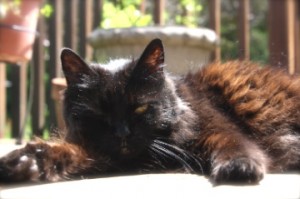
Whether you’re considering adopting a dog or cat from the shelter, boarding your pet, or maybe you’ve found a little kitten and you’ve decided to keep it, you do need some basic information regarding the respiratory illnesses that commonly infect cats and dogs.
Kennel Cough is a highly contagious disease in dogs. It is similar to the common cold in humans, and is transmitted in the same manner: through the air, direct contact, or from contaminated objects. Symptoms include: a dry, gagging (or “honking”) cough, nasal discharge, sneezing, lethargy (decreased energy), fever, and decreased appetite. There are vaccinations available to reduce the risk of infection.
Feline Upper Respiratory Infection, or URI, is also similar to the human cold in how it’s transmitted, and in symptoms. If you’ve recently adopted a cat, or found a kitten and it’s sneezing, has nasal and/or eye discharge, it most likely has a URI. Vaccinations are also available for cats to help minimize risk of infection.
The terms Kennel Cough and Feline Upper Respiratory Infection act as blanket terms to describe a set of symptoms, but there are various viruses and bacteria that can cause these illnesses. One of my cats gets recurring upper respiratory issues; sneezing, watery eyes and nasal discharge. She was diagnosed with feline herpesvirus as a kitten, an upper airway infection in which symptoms, like in her case, may recur throughout a lifetime. Luckily, her illness has never progressed into a secondary infection, and I have had success in treating her outbreaks with L-Lysine, an amino acid supplement. You can talk to your veterinarian about whether or not L-Lysine usage is appropriate for your cat.
When should you seek veterinary care?
Both Kennel Cough and Feline URI may be treated at home with supportive care. A humidifier can be used to provide relief for congestion, and keeping the pet isolated from other animals is important to minimize spreading the illness. Isolation from noisy areas can be beneficial to reduce stress so your pet can rest (we all appreciate some quite time when we’re under the weather, don’t we?). Use a warm, damp washcloth to gently wipe mucus from your cat’s nose and eyes. If kitty can’t breath well from her nose, she also can’t smell her food really well, and therefore may not be so interested in eating. In order to entice her appetite, feed her canned cat food that you’ve warmed slightly (if it’s too hot on your wrist, it’s too hot for her mouth). The smellier the food the better (canned tuna is also a good option)!
If you are at all concerned that the symptoms are getting worse, contact your veterinarian for an appointment. Don’t forget that if you’ve adopted a pet from the shelter, you may get one free exam included as part of the adoption package.
Just like with the human cold virus, secondary bacterial infections can occur that may require further treatment. Animals with weak immune systems, young or elderly pets, are more susceptible. If your pet stops eating for more than 24 hours, or if they are very lethargic, contact your veterinarian right away. Don’t hesitate to speak to your vet, allowing symptoms to worsen may lead to pneumonia or other serious complications.
Isolate a new pet for 10-14 days, and watch for any symptoms. If you have a sick pet in your home, make sure to sanitize the area where the pet has been: clean food dishes, litter boxes, floors, and bedding before another pet comes into contact with them. And remember to wash your hands after contact with a sick pet.
Boarding facilities, like animal shelters, house many animals in a relatively small environment. If one cat or dog is ill, many other animals within the vicinity may become infected. Because of this, boarding facilities require that pets be administered certain vaccinations prior to entering the facility. Even if the facility doesn’t specify, it would be beneficial to make sure the vaccines are administered at least several days before boarding, to ensure the vaccine has had adequate time to build immunity (no vaccine can provide 100% protection).
I recently visited the Humane Society for Southwest Washington, and was able to briefly speak to an adoption coordinator. She stated that the animal shelter works diligently to keep the facility sanitized, and animals showing signs of illness are quarantined until they are no longer contagious. I noticed staff members actively cleaning cages and kennels as I walked through, and the entire facility looked really clean. Even with intense cleaning practices, no shelter or boarding facility will ever be without the occasional outbreak, so it’s important that owners (and potential owners) understand what these diseases are, and how to properly protect and care for your pet.
Kennel Cough and Feline Upper Respiratory Infections are usually very easy to treat, and rarely become severe. They are not contagious to humans, and they definitely shouldn’t discourage you from considering adoption from a shelter. My kids and I had a nice time visiting with all the cats and dogs at the shelter, and it was heartwarming to see several people there actively searching for a new furry companion.
Visit the Humane Society’s website to take a look at animals in need of homes: www.southwesthumane.org/

